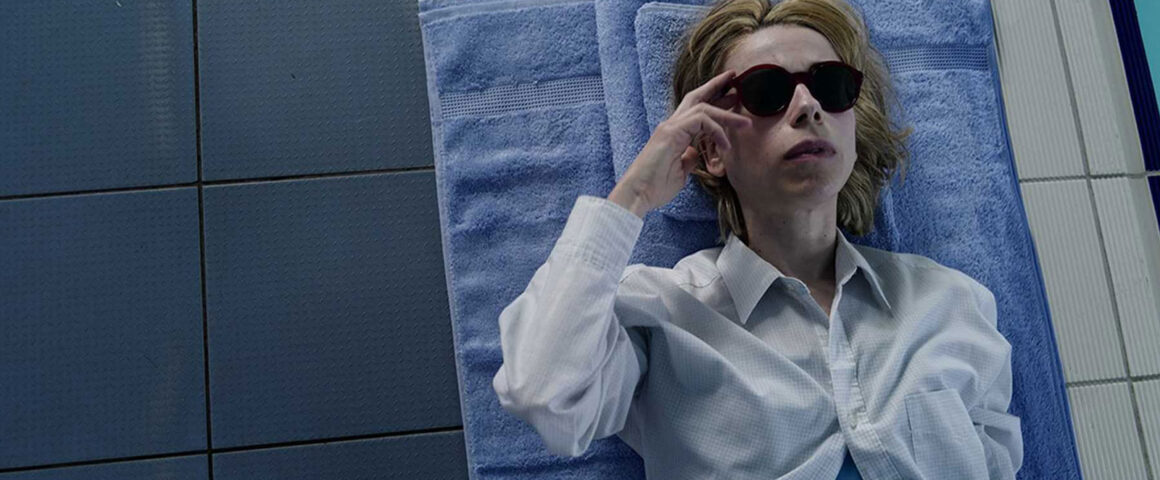As a famous nanny once said, “A spoonful of sugar helps the medicine go down.” And in the case of actor turned director Craig Roberts latest film, Eternal Beauty, there’s a lot of sweetness to help digest this painful tale. And with such acting talents as Sally Hawkins and David Thewlis starring within it, this sophomore feature feels like a delight even with its ultimately saddening subject matter.
Filled with the sounds of various voices, we meet Jane (Hawkins, “Maudie”), a paranoid schizophrenic woman going through a rough patch. She’s dealing with various levels of shame from her family, struggling with taking her new medication and continues to hear the sounds of a past romance at the worst of times. But as luck would have it, Jane meets Mike (Thewlis, “The Mercy”), an odd ball musician who captures her heart. Sure, he might not be able to sing like an angel, but he worships Jane’s sparkle like no one else. Yet not even the magic of love can concur the demons within our heroine — an element that Roberts never shies from. And thus we, as the audience, go on Jane’s journey towards discovering her own sense of solace, bumpy roads and all.
Permeated with fascinating visuals from beginning to end, Roberts freely takes us into Jane’s quirky world. It is one that is equally inviting as it is uncomfortable. Think Wes Anderson’s delicate touches mixed with Darren Aronofsky’s bold realities — a description that works in many facets, but mostly towards describing Jane herself. She’s a character that has a flat covered in precious decor, but is convinced she hears voices through the walls. Jane wears cozy cardigan sweaters, yet often dwells on thoughts of cannibalism. And to say this overall juxtaposition is unsettling may be the understatement of the year.
But what makes Eternal Beauty so refreshing is its overall optimistic view point. For Roberts’ examination of mental illness is not colored in muted tones, but rather pastel whimsy in every corner of the frame. And with the excellent talents of cinematographer Kit Fraser, art director Alison Adams, and production designer Tim Dickel working behind the scenes, this female gaze approach to something so grim is a stimulating shift from the norm.
The same set of descriptions can be used towards Roberts’ screenplay, for Eternal Beauty is narratively a blend of cringe and comfort. From Jane bringing over gifts for herself on Christmas morning, to the terrifying messages she hears over the radio, some scenes are earnestly charming while others evoke spine-tingling levels of creepy. This particularly comes across in a sequence involving Jane driving a car with a child inside. It’s the kind of moment that will either leave audiences wanting to continue or stop them right in their tracks. But regardless of your own reaction, Roberts should be commended for his willingness to go the cinematic distance for the emotional punch to the gut.
Yet even with all of Jane’s drama on display, Eternal Beauty never judges its lead character. Because Jane is an unconventional leading lady that, despite her flaws, is easy to cheer for. This aspect is due in large part to Sally Hawkins’ beautiful yet calculated performance. From quite moments of melancholy to warm looks of glee, Hawkins knows exactly when to punch up the dramatics and when to hold back like a skilled athlete. And though Jane shares a lot of similarities to Hawkins’ character Eliza from “The Shape of Water” (including a singing day dream sequence), Hawkins makes Jane a unique individual that is hard for any viewer to ever forget.
The rest of the cast does a lovely job of bringing Jane’s family and friends to life as well. David Thewlis gives Mike the right amount of heart and awkwardness to make him problematically lovable, while Penelope Wilton (“Summerland”) gives quite a cold, yet believable, performance as Jane’s strict mother. But the true standouts next to Hawkins is Billie Piper (“Doctor Who” TV series) and Alice Lowe (“Sometimes Always Never” ) as Jane’s sisters, Nicola and Alice. When it comes to Nicola, Piper perfectly personifies the failed prom queen archetype, who has no moral code. Lowe’s Alice on the other hand, is the glue that holds this dysfunctional family together, even in the midst of her own internal drama.
The organic quality shown through the characters, along with the story itself, is what makes Eternal Beauty a fascinating cinematic gem. It’s by no means an easy watch and may require a few breaks to get through, but the conclusion to Jane’s story is one that is relatable to a fault. And in a year in which happy endings are hard to come by, audiences may find themselves looking to characters like Jane for guidance. For she’s taking life one step at a time — a lesson we all should follow.



